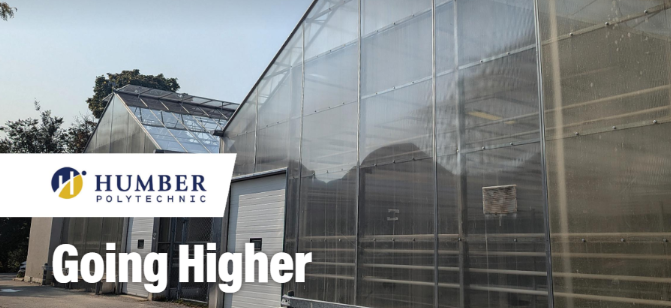
3 minute read
Going Higher
A new kind of farming is coming to Canada, and Humber Polytechnic isn’t missing out.
“You notice this incredible efficiency,” says Dave Smiderle, Associate Dean of Continuous Professional Learning at the Toronto-based institution.
“There’s nary a stray plant out of order. You see the hydroponics going across. It almost looks like something out of science fiction.”
This is vertical farming, and it is what it sounds like: hundreds of plants growing stacked in a controlled environment, with farmers spending a lot more time operating advanced systems behind a screen than working in the field — or at least, that’s its most advanced version. Smiderle says vertical and indoor farming could play a crucial role in the future of agriculture, offering benefits for efficiency, weather protection, and even staffing and recruitment.
“It’s a very tough gig to be a farmer,” he says. “We just don’t have enough people. That’s a big deal, because we all still have to eat. Vertical farming represents a way of using automation and advanced manufacturing to address some of that issue.”
So Humber is doing its part to help, inspired partially by conversations with AMC. The college is offering Eastern Canada’s first Vertical Farming micro-credential program to 30 students this fall with funding from Upskill Canada, a national employment initiative focused on opening career paths for Canadians.
The program will cover a wide range of topics on vertical farm setup, technology, production, and profitability with support from the University of Guelph, who will be contributing faculty members with expertise in controlled environments. Learning is online and in-person, including a work-integrated learning component.
Vertical farming is in its infancy in Canada — few operations are up and running — and Humber’s program aims to make it more accessible. But as Smiderle clarifies, it’s not a replacement for traditional farming.
“Dry land farms are critical,” he says. “It’s all about having options. People who say, ‘I don’t want to get into farming,’ you might want to get into this kind of farming, because it’s actually about process optimization.”
“It might be a way of continuing the tradition of farming for certain family members,” he adds. “For example, ‘Mom and Dad, I don’t want to take on your 1,000-hectare farm, but you know what? I’d really love to run the indoor farm part of our business.’”
Humber Polytechnic anticipates its own continued research in agri-tech going forward. “This is a great first step for us, or second step,” Smiderle says. “It’s just going to get bigger and better.”





